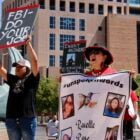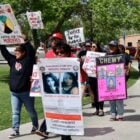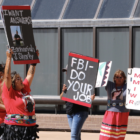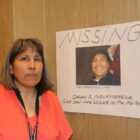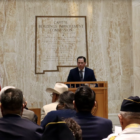Indigenous Affairs
New Mexico AG greenlights new task force, creates online portal for missing Indigenous people
|
This reporting was supported by the International Women’s Media Foundation’s Fund for Indigenous Journalists: Reporting on Missing and Murdered Indigenous Women, Girls, Two Spirit and Transgender People (MMIWG2T). Attorney General Raúl Torrez plans to establish a task force focused on the disproportionate rates at which Indigenous people experience violence and go missing, the New Mexico Department of Justice announced Tuesday. The agency also launched the initial phase of an online portal for tracking cases of missing Indigenous people. Gov. Michelle Lujan Grisham’s administration in mid-2023 dissolved a group dedicated to addressing a crisis of missing and murdered Indigenous people. Advocates and affected families spoke against the decision, saying their work was just beginning.
The Legislature seemed to agree, unanimously passing Senate Joint Memorial 2 last month calling on Torrez to convene tribal representatives, survivors and families, and law enforcement officials to update a state response plan created by the defunct task force in 2022 and offer legislative recommendations.
The state budget includes $200,000 for that purpose.
A spokesperson for Torrez, Lauren Rodriguez, said he’ll follow the Legislature’s guidance outlined in the memorial as he figures out the task force’s membership.
The public portal unveiled on Tuesday — which includes 201 missing Indigenous people, with an average time missing of 2,886 days, or nearly eight years — comes two years after lawmakers mandated it.
Lawmakers in 2022 passed a bill requiring the attorney general’s office to develop an online portal for cases of missing Indigenous people.
